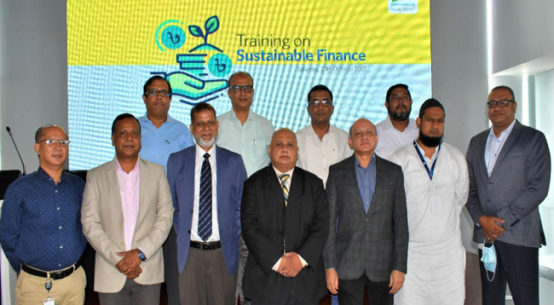Bangladesh, the second largest readymade garment exporter in the world, is poised to embark on a transformative journey towards circularity in its industrial practices.
Circularity presents a significant opportunity for Bangladesh to reduce its environmental impact, improve its economic performance, and create social benefits.
However, embracing circularity also poses certain challenges for Bangladesh’s apparel industry that must be collectively considered and resolved.
To address this, an esteemed panel of industry leaders, policymakers, and experts in circular economies convened for the “Switch to Upstream Circularity Dialogue: Pre-consumer Textile Waste in Bangladesh” event at a city hotel Sunday.
The dialogue covered the strategies, policies, infrastructure, collaborations, and innovations necessary to build a thriving circular ecosystem in Bangladesh.
This event was organized under the Switch to Circular Economy Value Chains project (SWITCH2CE), co-funded by the European Union and the Government of Finland, said a press release.
SWITCH2CE is led by United Nations Industrial Development Organization (UNIDO), in collaboration with Chatham House, Circle Economy, and European Investment Bank, and supports the switch to circularity in selected global value chains.
A diverse group of stakeholders, including brands, manufacturers, policymakers, and financial institutions attended the event.
Saber HossainChowdhury, MP, Chair of the Parliamentary Standing Committee on the Ministry of Environment, Forest and Climate Change, Bangladesh, and the Special Envoy to the Prime Minister Sheikh Hasina for Climate Change, was present in the opening session as chief guest.
Faruque Hassan, President, Bangladesh Garment Manufacturers and Exporters Association (BGMEA) spoke at the opening session as a special guest.
Dr. Bernd Spanier, Deputy Head of Mission, Delegation of European Union to Bangladesh, Mark Draeck, Chief Technical Advisor on SWITCH2CE at UNIDO and Holly Syrett, Director of Impact Programmes& Sustainability at Global Fashion Agenda also contributed to the event’s opening session.
Hilde van Duijn, Head of Global Value Chains, Circle Economy, also participated in the event and made Circular Game Demonstration.
The event comprised two panel discussions centered on critical topics such as the business model and incentives for various manufacturers in Bangladesh to proactively participate in circular ecosystems, the criteria for textile waste management processes to capture value in the country, and how to ensure the inclusion of, and collaboration with, current traders.
The dialogue also shed light on the pivotal role of BESTSELLER and its collaboration with manufacturers in driving circularity and adopting recycled materials.
Faruque Hassan, President, Bangladesh Garment Manufacturers and Exporters Association (BGMEA), said, “For BGMEA, circularity sits in the core of our values, mission and vision. Our goal is to help conserve the natural eco-system as much as possible via an economic shift from a linear to circular system, while generating greater social and economic values.”
Alexander Granberg, Senior Project Specialist, BESTSELLER said, “Bangladesh is a key sourcing country for BESTSELLER, with many long-standing business partners, and that makes Bangladesh an obvious starting point for creating systemic changes in regard to waste segregation….This substantial project can, via its relevant business case, ensure that our partners stay motivated throughout this transition.”
Federica Marchionni, CEO, Global Fashion Agenda, said, “The transformation to a circular economy requires collective efforts beyond the capabilities of any individual agent or company. Therefore, we are honoured to be coordinating this multistakeholder partnership between a group of esteemed organisations.”
Nin Castle, Chief Program Officer- Co-Founder, Reverse Resources said, “This expansion will also enable the fulfilment of the growing demand for recycled products, reduce dependence on fibre imports, and achieve environmental targets.”
Mark Draeck, Chief Technical Advisor said, “The project also collaborates with government partners, academia, and NGOs to create an enabling environment for circularity through policy and tailored capacity building.”

